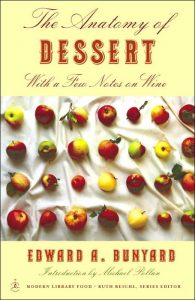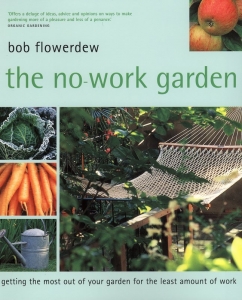An Anatomy of Dessert (Edward Bunyard), The No-Work Garden (Bob Flowerdew) and The Bad Tempered Gardener (Anne Wareham)

The Anatomy of Dessert…with a few notes on wine, by Edward Bunyard
Edward Bunyard, The Anatomy of Dessert. With a few Notes on Wine. New York 2006 (New edition of the famous book from the 1920s)
The art of savouring taste, or a justification of Adam.
What a wonderfully passionate and opinionated style; it is a rare pleasure to being lectured in such a way. Bunyard deals with the difficulties of describing taste and ingeniously seeks help or draws comparisons from music, philosophy and literature, not to forget important anecdotal evidence. This funny book is a serious delight. We should have a Bunyard apple, together with the Bunyard apple approach. I feel embarrassed that I had so often in the past picked and devoured apples and pears like a monster, without fondling and kissing them beforehand, let alone storing them carefully, wrapped and nursed to be eaten on the perfect day and temperature at 7.35pm with eyes closed, after the ideal dinner… Now we know why Adam & Eve did risk it, but they had to wait long for this justification.
Bunyard rather described how to enjoy fruit like a loving poet in a glowing language instead of dwelling on the technical details of how to grow them, although it is an easy guess that he would have been perfectly familiar with his basics and particulars. So this is for armchair reading, not the potting shed or to be taken with you on the pruning session. And don’t forget to decant the wine in the meantime.
It doesn’t matter at all that the book is somewhat out of date. On the contrary, it is rather interesting to realise the legacy or fate of some varieties. It should be an evergreen.
The encouraging introduction to the modern library food series (i.e. the renaissance of partly forgotten culinary treasures or classics) by Ruth Reichl makes one curious indeed. The only drawback is the shortness of the book. I would have loved photographs of the man and some of his fruits, let alone more of his essays.

The No-work Garden – getting the most out of your garden for the least amount of work, by Bob Flowerdew
Bob Flowerdew, The no-work garden, getting the most out of your garden for the least amount of work. Kyle Cathie 2002.
What a brilliant name for a gardener; a pen name could not be more fitting.
There can be no doubt the reading audience will get the overall impression that a nice chap is speaking about and sharing his first hand experience and experiments. The BBC listeners to Gardener’s Question Time would know that already. His stand against quick make-over-gardens and experts without own gardening experience, particularly from the design and media departments, is as important as his warning of overreaching oneself through wrong role models or unrealistic expectations.
The book is a treasure trove of labour saving advice and questioning of received (and perceived received?) wisdom, yet the title (not the subtitle!) is a euphemism if not simply a misnomer. Of course, we all know what Bob means, particularly after he takes care to drive his message home again and again, sometimes with a snub too many towards the “old boys”. And what a good ambassador of his messages he is can already be seen in the photographs of himself pottering about in immaculate white sneakers…
An appealing title or headline is certainly a selling factor, but it is to be hoped that few people are being put off by the still existing amount of work being described and recommended between the pages. Hopefully some of it is still so much pleasure that they don’t interpret it as work in its negative connotation. In any case, if the balance of gardening aims and tasks starts to get slightly shifted, it would be a welcome outcome, not the least for innocent neighbours or unassuming passers-by that have to endure smoking leave heaps in autumn. I suppose even the most experienced gardeners need to ask themselves occasionally why they are doing things at all or in a particular way, so help in that regard should be welcome.
However, the lecturing attitude seems slightly overdone together with the casual hint at what a fine and clever fellow the author is. And what kind of friends does the gardening expert have, when he cannot give them straight and proper advice before or on the spot (p. 105f) when planting fruit trees, but making a meal out of it later in a book? That is an unnecessary piece of uncharitable writing.
Perhaps I am a little naive, but I don’t believe in his all too often reiterated strawberry vs. radishes example after the Chinese proverb (“If you wish to eat strawberries do not sow radishes”). I suppose this has more of a philosophical general meaning, in the sense that one should try to do what one prefers, if possible, instead of what is expected or received wisdom or unquestioned habit, but do people in their allotments and elsewhere really sow their radishes in order to neglect or abhor them when ready? Presumably, the gardener of all persons gets best away when comparing apples and oranges.
Unfortunately the editing of the book seems to have taken the message of the title somewhat too literally and neglected the weeding and pruning recommended inside. There are far too many spelling mistakes, apparently incomplete sentences and even the bedding out of identical sentences within a quarter of a page (p. 99 hardcover).
But of course, they have to move fast in this ocean of gardening literature. Sometimes I suspect readers have to “endure” all this because many clever gardeners have found out that writing about gardening is much more lucrative than gardening itself, even if this could mean initially more work and eventually less pleasure for them. The wits amongst them take their revenge by recommending shredded paper as mulch…

The Bad Tempered Gardener, by Anne Wareham
Anne Wareham, The Bad Tempered Gardener, London, Frances Lincoln 2011
Beware! (Th)ink in Gardens.
The best books are those where you can differ from the authors’ views and still accept or even enjoy their opinions.
The bad tempered gardener is not quite so. It reads like a forced affair, pretends to hate the established garden world with its journals and TV nuisance but longs to be part of it. (And how proud the author is when a supposedly anarchistic article by her appears in a supposedly renowned journal.) The self congratulatory attitude of Anne Wareham is an embarrassing nuisance, so much so that one even disagrees when one would like to agree, in comparison to authors like Christopher Lloyd where one agrees even if one (occasionally) disagrees.
It is astonishing how truisms or personal preferences are being traded as provocative or thoughtful. Perhaps after it worked so satisfactory to spill a lot of ink for mere effect in a garden (pool) the equally bad tempered writer wanted to replicate this technique in a book. Just think of it: to give depth to shallow waters. No wonder the action group ‘(Th)ink in gardens’ had been founded. To lecture us whether to clean a spade or to turn a compost heap and otherwise barking at the reader and constantly loving this and hating that, finding that good and this bad? Yet, the bull advertising in the china shop, for the china shop and for the bull, is a remarkable idea.
I will certainly try to visit this garden, despite the book. In an ideal world, the telly in the woods will have disappeared as too cheap a joke (unless showing the Chelsea Flower Show or famous rose gardens) and, perhaps, even the population gate as a little ostentatious. I also have some doubts about the tithe map hedge as a suitable reference to local history. Isn’t this (though original) attempt not somewhat comparable with the immaculate folly cottage in grand picturesque parks? Or with the (imagined) effort of a Parisian suburban dweller to create a box topiary of the Eiffel Tower in the front garden to connect with the city? No wonder the neighbours are being a little mischievous.
Since the ambitious title plays with (though not new) associations, a quotation from a quite different walk of life seems fitting: “This is the very disease against which it pretends to be the cure”.
